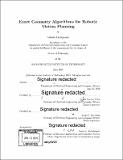| dc.contributor.advisor | Tomás Lozano-Pérez and Leslie P. Kaelbling. | en_US |
| dc.contributor.author | Deshpande, Ashwin. | en_US |
| dc.contributor.other | Massachusetts Institute of Technology. Department of Electrical Engineering and Computer Science. | en_US |
| dc.date.accessioned | 2019-11-04T20:21:47Z | |
| dc.date.available | 2019-11-04T20:21:47Z | |
| dc.date.copyright | 2019 | en_US |
| dc.date.issued | 2019 | en_US |
| dc.identifier.uri | https://hdl.handle.net/1721.1/122736 | |
| dc.description | Thesis: Ph. D., Massachusetts Institute of Technology, Department of Electrical Engineering and Computer Science, 2019 | en_US |
| dc.description | Cataloged from PDF version of thesis. | en_US |
| dc.description | Includes bibliographical references (pages 103-113). | en_US |
| dc.description.abstract | The current generation of robotic motion planning algorithms is dominated by derivatives of the PRM and RRT algorithms. These methods abstract away all geometric information about the underlying problem into a collision checker. While this approach yields simple and general purpose algorithms, it often comes at the cost of theoretical guarantees and performance. In this thesis, we explore deterministic motion planning algorithms that have explicit knowledge of the geometry of the underlying problems. By exploiting this geometry, we give algorithms that can achieve stronger theoretical guarantees and better performance in some problems. This thesis is divided into two main sections comprising of two different motion planning scenarios. In the first case, we explore issues of decidability in task and motion planning by giving a decision procedure for prehensile task and motion planning. In the second section, we present a holonomic motion planning algorithm that can almost always identify the exact optimal solution as a system of differential equations, which can be numerically solved to produce an asymptotically-optimal solution. | en_US |
| dc.description.statementofresponsibility | by Ashwin Deshpande. | en_US |
| dc.format.extent | 113 pages | en_US |
| dc.language.iso | eng | en_US |
| dc.publisher | Massachusetts Institute of Technology | en_US |
| dc.rights | MIT theses are protected by copyright. They may be viewed, downloaded, or printed from this source but further reproduction or distribution in any format is prohibited without written permission. | en_US |
| dc.rights.uri | http://dspace.mit.edu/handle/1721.1/7582 | en_US |
| dc.subject | Electrical Engineering and Computer Science. | en_US |
| dc.title | Exact geometry algorithms for robotic motion planning | en_US |
| dc.type | Thesis | en_US |
| dc.description.degree | Ph. D. | en_US |
| dc.contributor.department | Massachusetts Institute of Technology. Department of Electrical Engineering and Computer Science | en_US |
| dc.identifier.oclc | 1124682409 | en_US |
| dc.description.collection | Ph.D. Massachusetts Institute of Technology, Department of Electrical Engineering and Computer Science | en_US |
| dspace.imported | 2019-11-04T20:21:46Z | en_US |
| mit.thesis.degree | Doctoral | en_US |
| mit.thesis.department | EECS | en_US |
